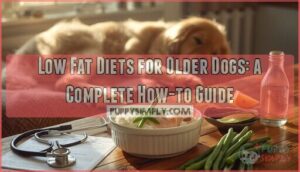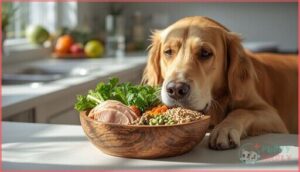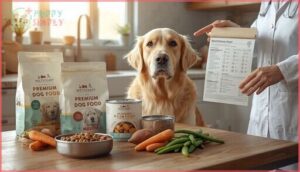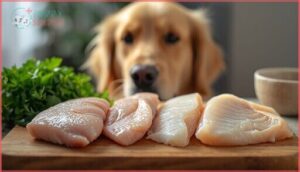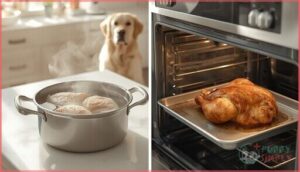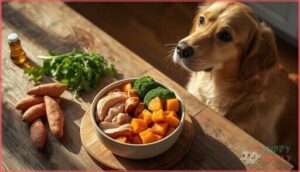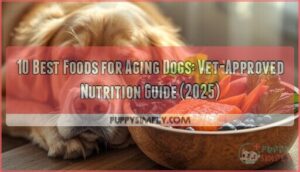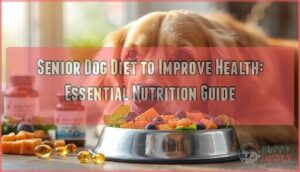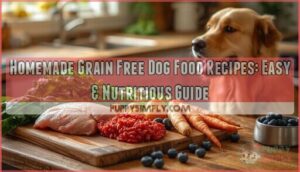This site is supported by our readers. We may earn a commission, at no cost to you, if you purchase through links.
Your thirteen-year-old Golden Retriever has started refusing meals, vomiting occasionally, and her energy seems to drain faster than it used to. Your vet runs bloodwork and delivers a diagnosis you weren’t expecting: pancreatitis, hyperlipidemia, or perhaps a liver condition that demands immediate dietary intervention.
Suddenly, fat content—something you’ve never scrutinized on a dog food label—becomes the most critical number between you and your dog’s comfort. Low-fat diets for older dogs aren’t just about weight management; they’re therapeutic protocols that can prevent painful flare-ups, reduce organ inflammation, and extend quality years with your companion.
The challenge lies in balancing restriction with nutrition, ensuring your senior dog receives adequate protein, essential fatty acids, vitamins, and minerals while keeping fat percentages low enough to protect compromised organs.
Table Of Contents
- Key Takeaways
- Why Low Fat Diets Benefit Older Dogs
- Recognizing When a Low Fat Diet is Needed
- Key Nutritional Needs for Senior Dogs
- Choosing Low Fat Dog Foods
- Homemade Low Fat Dog Food Recipes
- Transitioning to a Low Fat Diet Safely
- Monitoring Health on a Low Fat Diet
- Managing Treats and Snacks for Senior Dogs
- Supporting Overall Well-being Beyond Diet
- Frequently Asked Questions (FAQs)
- Should senior dogs eat less fat?
- What is the best diet for senior dogs to lose weight?
- What can dogs eat on a low-fat diet?
- What can I feed my senior dog to gain weight?
- What are the risks of a low-fat diet?
- Can low-fat diets affect nutrient absorption?
- How to transition to a low-fat diet?
- Do low-fat diets impact energy levels?
- What indicators suggest reduction in dietary fat?
- Can low fat diets cause nutritional deficiencies?
- Conclusion
Key Takeaways
- Senior dogs with pancreatitis, hyperlipidemia, or liver conditions need therapeutic low-fat diets—typically 5-15% fat on a dry matter basis—to prevent painful flare-ups and reduce organ inflammation while maintaining adequate protein and essential nutrients.
- Certain breeds like Miniature Schnauzers, Miniature Poodles, and Labrador Retrievers carry heightened genetic risks for fat-related conditions, making preventive dietary management critical even before symptoms appear.
- Transitioning to low-fat food requires a gradual 7-14 day introduction period with careful monitoring of stool quality, energy levels, and body condition, plus regular veterinary check-ups including bloodwork to assess lipid panels and organ function.
- Homemade low-fat meals using lean proteins like skinless chicken or white fish must be properly supplemented with omega-3 fatty acids, vitamins A, D, E, K, and minerals to prevent nutritional deficiencies that can arise from extreme fat restriction.
Why Low Fat Diets Benefit Older Dogs
Your senior dog’s metabolism changes as they age, and fat becomes harder to process efficiently. Certain health conditions make high-fat foods genuinely risky, not just less ideal.
As dogs age, their bodies struggle to process fat efficiently, turning high-fat foods into genuine health risks
Understanding why fat restriction helps older dogs means looking at specific health issues, breed vulnerabilities, and the dual nature of fat itself.
Common Health Issues Addressed by Low Fat Diets
Your senior dog’s shift to low-fat dog food often stems from concrete health challenges that demand careful canine health intervention. Pancreatitis management tops the list, as excessive fat triggers painful pancreatic inflammation in older dogs. Other conditions also respond well:
- Hyperlipidemia control lowers circulating triglycerides and cholesterol through dietary fat restriction
- Inflammatory bowel disease benefits from reduced fat intake, easing digestive strain
- Obesity prevention relies on fat-controlled calories to protect joints and metabolic function
- Liver disease sometimes requires adjusted fat tolerance to support hepatic recovery
These conditions share a common thread: fat restriction reduces physiological stress while supporting dog nutrition fundamentals. Effective science writing involves using clear science concepts to communicate complex ideas about canine health.
Breeds and Conditions Requiring Fat Restriction
Certain breeds carry a heightened pancreatitis risk, making breed-specific diets a cornerstone of preventive canine health and nutrition. Miniature Schnauzers and Miniature Poodles need fat intolerance vigilance, while obesity-prone Labrador Retrievers and Beagles require careful hyperlipidemia control. Pugs and English Bulldogs benefit from low-fat dog food to ease respiratory strain, and Asian breeds like Chows may show GI sensitivity.
Pancreatitis management and hyperlipidemia demand customized canine nutrition, especially in seniors with diagnosed conditions or genetic predispositions. Understanding language resources can help owners make informed decisions about their dog’s diet and health.
Fat as an Essential but Risky Nutrient
Fat delivers more than twice the calories per gram of protein or carbohydrates, boosting energy density but risking weight gain in less active seniors. You need fat for essential fatty acids, fat solubility of vitamins A through K, and palatability, yet excess triggers pancreatitis and hyperlipidemia. Dietary balance matters:
- Linoleic and alpha-linolenic acids support skin and coat health.
- Omega-3s from marine sources aid cognitive function in aging dogs.
- Fat content above 4 g per 100 kcal raises pancreatitis risk.
- Low fat diets for dogs prevent lipid-related complications.
- Nutrient interactions facilitate absorption without caloric overload.
Smart low-fat dog food choices honor both safety and biological need.
Recognizing When a Low Fat Diet is Needed
You’ll need to watch for specific warning signs that tell you when it’s time to switch your senior dog to a low-fat diet. Some dogs show subtle symptoms that build over time, while others have already been diagnosed with conditions that require immediate dietary changes.
Whether you’re managing an existing health problem or preventing future complications, recognizing these indicators early helps you protect your dog’s long-term health.
Signs Your Senior Dog May Need Dietary Changes
You’ll notice dietary red flags when your dog’s appetite drops over several days or unexplained weight loss appears despite consistent meals. Watch for lethargy paired with abdominal tenderness, regular vomiting, or frequent greasy stools that signal digestive trouble.
Changes in coat quality—dull fur, flaky skin—often hint at nutritional gaps. These aging pet symptoms warrant senior health checks and veterinary guidance to determine if canine dietary needs include shifting to low-fat diets for dogs.
Diagnosed Conditions Like Pancreatitis, Hyperlipidemia
A pancreatitis diagnosis commonly follows elevated serum triglycerides, clinical signs of abdominal pain, and imaging results. Hyperlipidemia control demands fat restriction—often targeting 8-12% fat on a dry matter basis—paired with regular lipid panels.
Dietary therapy under veterinary guidance minimizes pancreatic stimulation, reduces inflammation flare-ups, and keeps cholesterol in check. These low-fat dog food plans protect senior health while meeting essential fatty acid requirements.
Preventive Use for At-risk Older Dogs
Sometimes fat restriction acts as preventive care before symptoms ever appear. If your senior dog carries breed predisposition to hyperlipidemia or pancreatitis—think Miniature Schnauzers—dietary management becomes a risk assessment tool.
Veterinary-guided low-fat diets for dogs preserve senior health by addressing subclinical lipemia and supporting digestion. You’ll pair this preventive care with monitoring for fat-soluble vitamin deficiencies and adjusting low-fat dog food portions to maintain ideal senior dog care.
Key Nutritional Needs for Senior Dogs
Your senior dog’s nutritional needs shift as metabolism slows, activity decreases, and certain health vulnerabilities emerge. A low-fat diet for older dogs isn’t just about cutting calories—it requires careful attention to protein quality, carbohydrate digestibility, and micronutrient balance to support lean muscle, organ function, and overall vitality.
Here’s what you need to prioritize when formulating or selecting a diet for your aging companion.
Protein Requirements for Aging Dogs
Your senior dog’s muscle preservation depends heavily on protein intake—usually 1.0 to 1.5 grams per kilogram of body weight daily. High-quality, digestible sources like chicken or fish deliver essential amino acid balance that aging tissues need.
Low-fat dog food should prioritize intact animal proteins with ideal nutrient ratios to support immune function and lean mass, especially when managing canine nutrition and diet alongside senior dog care protocols.
Ideal Fat Percentages for Older Canines
Most older dogs thrive on 10 to 20 percent fat on a dry matter basis, though your senior’s ideal range hinges on health status and weight management goals.
Dogs with pancreatitis risk may need 10-15 percent, while those with hyperlipidemia often require stricter fat restriction near 5-10 percent.
You’ll adjust dietary fat content based on body condition, bloodwork, and veterinary guidance for ideal senior nutrition and canine health.
Importance of Digestible Carbohydrates and Fiber
When fat drops in your senior’s bowl, digestible carbohydrates step up to fuel daily activity without excess calories. Soluble fiber slows glucose spikes and promotes satiety, while insoluble fiber keeps stool bulk healthy—critical when switching to low-fat dog food.
This digestive balance nurtures gut health and microbiota diversity, cornerstones of senior nutrition that preserve energy and lean mass as your dog ages.
Essential Vitamins, Minerals, and Fatty Acids
You’ll need vitamin A around 1,000 to 2,000 IU per kilogram daily and vitamin E from 25 to 75 IU per kilogram to guard antioxidant defenses. Mineral supplements support bone density with calcium at 1.0 to 1.8% dry matter.
Omega-3 fatty acids, especially EPA and DHA at 0.1 to 0.4%, sharpen your dog’s fatty acid profile, reducing inflammation. Low-fat dog food maintains nutritional balance without sacrificing protein sources.
Choosing Low Fat Dog Foods
You’ll find dozens of low-fat dog foods on store shelves, but not all of them meet your senior dog’s specific needs. The right choice depends on regulatory standards, ingredient transparency, and how well the formula matches your dog’s health profile.
Let’s walk through what to look for when evaluating commercial options and how your veterinarian fits into the decision.
Evaluating AAFCO Compliance and Ingredient Quality
When you’re selecting low-fat dog food for your senior, verifying AAFCO Standards and ingredient sourcing protects your pet’s health and nutrition. Label verification confirms that the product meets nutrient profiling requirements for adult maintenance or weight management, while compliance audits or manufacturer disclosures provide additional reassurance.
- Check that the AAFCO statement specifies adequacy through feeding trials or formulation by a veterinary nutritionist.
- Look for named animal proteins—chicken, turkey, fish—in the first five ingredients to guarantee quality protein sourcing.
- Confirm the guaranteed analysis lists fat percentages suitable for low-fat needs, usually 5–10 percent on a dry matter basis.
- Verify the presence of supplemental omega-3 and omega-6 fatty acids to support nutritional balance and coat quality.
Comparing Commercial Options (e.g., Weruva, Squarepet)
Once you know what you’re looking for on labels, fat content comparison across brands clarifies which products suit your senior’s needs. Weruva and Squarepet market low-fat dog food lines with crude fat often landing between 5–8 percent, though brand ingredient analysis shows texture and protein source shift those numbers.
Product recall alerts and customer review insights reveal batch consistency, so verify each SKU’s nutrient profile evaluation before purchase.
Consulting Your Veterinarian for Recommendations
After comparing brands, you’ll benefit most from veterinary guidance and a full medical assessment. Your vet can tailor diet planning to your dog’s bloodwork, weight history, and comorbidities, ensuring vet-approved meals support health monitoring over time.
Nutrition counseling clarifies which low-fat dog food formulations work for pancreatitis versus hyperlipidemia, linking veterinary care directly to long-term pet health management and dog health and wellness goals.
Homemade Low Fat Dog Food Recipes
You can prepare balanced, low-fat meals at home if you choose your ingredients carefully and follow veterinary guidance. The key is selecting lean proteins, using cooking methods that don’t add fat, and supplementing appropriately to meet your dog’s complete nutritional needs.
Here’s what you need to know about building homemade recipes that support your senior dog’s health.
Lean Protein Sources (chicken, Turkey, Fish)
You’ll want to build meals around skinless chicken breast or turkey, which pack about 31 g protein per 100 g with just 3.6 g fat—ideal Lean Meat for your Low-Fat Dog Food plan.
Fish options like tilapia, haddock, or cod deliver excellent Protein Quality under 5 g fat per 100 g, bringing Omega Balance that aids joints.
These Protein Sources anchor Dog Nutrition and Diet without triggering pancreatitis, making Poultry Nutrition and white-flesh fish your go-to Meat Alternatives for a Low-Fat Diet.
Low-fat Cooking Methods (boiling, Baking)
Two Cooking Safety methods—boiling and baking—drive Fat Reduction in Homemade Dog Food without added oils. Boiling lean poultry in water preserves moisture and protein, while Baking Methods let excess fat drip away during roasting. Your Meal Preparation gains simplicity:
- Boil skinless chicken in plain water, discard fat-laden broth.
- Bake turkey breast at 350°F until internal temp hits 165°F.
- Poach white fish gently to retain lean texture.
- Avoid searing or frying that adds unnecessary fat.
- Cool completely before portioning into LowFat Dog Food Recipes.
These Boiling Techniques anchor your Low Fat Diet plan safely.
Sample Recipes and Balanced Meal Ideas
Each Homemade Dog Food Recipe you build demands careful meal planning to hit 5–10 percent fat on a dry matter basis for senior conditions. Food preparation starts with lean protein—skinless turkey, white fish—paired with sweet potato or rice for digestible energy, then finished with a vet-approved meal ratio that ensures nutrient balance without recipe modification guesswork.
| Ingredient | Portion (per 10 lb dog) |
|---|---|
| Skinless turkey breast | 3 oz cooked |
| Sweet potato | 2 oz mashed |
| Broccoli | 1 oz steamed |
| Fish oil | ¼ tsp |
Supplementing With Essential Nutrients
Nutritional balance in homemade low-fat diets for dogs hinges on vitamin supplements and mineral supplements added after cooking destroys heat-sensitive compounds. You’ll need omega-3 rich oil—fish or algae-based—to deliver EPA and DHA for joint support, plus vitamin E, zinc, and B-complex to offset nutrient fortification gaps that fat restriction creates, ensuring omega-3 benefits reach aging tissues without toxicity risk.
- Fish oil or algae sources provide essential fatty acid sources with minimal fat load
- Vitamin E protects cell membranes when dietary fat drops below typical levels
- Zinc maintains coat integrity, a common concern in fat-restricted senior formulas
- B-vitamin complex maintains energy metabolism and appetite in older dogs
- Calcium-phosphorus ratio requires attention to preserve bone health on modified diets
Transitioning to a Low Fat Diet Safely
Switching your senior dog to a low fat diet isn’t something you should rush, even when the health benefits are clear. A sudden dietary change can upset your dog’s digestive system, trigger food refusal, or mask underlying tolerance issues that need monitoring.
You’ll protect your dog’s comfort and nutritional stability by introducing the new diet gradually over 7 to 10 days while watching closely for signs of acceptance or distress.
Gradual Introduction of New Foods
Your dog’s system needs time to adapt, so stretch the shift over 7–14 days to protect gut health and prevent digestive issues like vomiting or diarrhea. Start by mixing 10–20% of the new low-fat food with your current diet, then increase that share gradually each day.
This dietary adjustment helps avoid new food intolerance while supporting dog weight management goals.
Monitoring for Digestive Tolerance and Acceptance
Once you’ve begun the shift to low-fat diets for dogs, watch your dog’s stool consistency daily—you’re checking for digestive health and tolerance testing results. Track meal acceptance, energy levels, and any vomiting or diarrhea that signals digestive issues.
Food trials spanning 7–10 days reveal nutrient absorption patterns, supporting dog weight management while safeguarding gastrointestinal health in dogs through careful stool analysis.
Tips to Encourage Picky Eaters
When your senior dog turns up their nose at low-fat meals, you’re not alone—many older dogs resist unfamiliar textures or bland profiles. Try these strategies to boost appeal:
- Food Variety: rotate protein sources like turkey, white fish, or egg whites
- Aroma Stimulation: warm meals slightly to release enticing scents
- Texture Mixing: combine wet homemade dog food with dry kibble
- Meal Timing: offer smaller portions throughout the day rather than large servings
Monitoring Health on a Low Fat Diet
Once you’ve transitioned your senior dog to a low-fat diet, your job shifts to watching how well it’s working. You’ll need to track several key indicators, from weight changes to lab results, to catch problems early and adjust the plan as needed.
Here’s what to monitor and how often you should be checking in.
Tracking Weight, Body Condition, and Energy
Consistently tracking weight monitoring, body scoring, and energy levels gives you the clearest picture of how your lowfat dog recipes are working. Weigh your dog weekly for the first month, then monthly once you’ve reached a healthy weight. Use a 1–9 body condition scale to assess fat coverage and muscle tone.
Watch for changes in activity—sluggishness may signal you need to adjust portions or consult your vet about canine nutrition and fat reduction goals under proper health tracking and nutrition guidelines.
Watching for Stool Quality and Coat Changes
Beyond weight and energy, stool quality reveals how well your senior dogs tolerate low-fat diets. Look for:
- Firm, well-formed stools, indicating proper digestive care for dogs
- Normal stool color (brown; avoid tarry black or bloody stools)
- Healthy coat shine, reflecting nutritional benefits of dog food
- Skin health free of dryness or flaking
- Infrequent dosing (1–2 times daily versus multiple loose episodes)
Persistent digestive issues warrant fecal analysis.
Scheduling Regular Veterinary Check-ups and Lab Work
Regular vet visits anchor your senior dogs’ health monitoring. Most practices recommend biannual exams for older pets, with quarterly check-ups if chronic conditions exist.
Annual bloodwork—CBC, chemistry panel, urinalysis—screens kidney function, liver enzymes, and lipid panels to assess how the low-fat diet affects weight management and digestive issues.
Many clinics offer reminder systems and home blood-draw services to simplify veterinary scheduling.
Managing Treats and Snacks for Senior Dogs
Treats can sabotage a low-fat diet faster than you’d expect, especially when your senior dog’s giving you those pleading eyes. You’ll need to rethink your usual snack routine, counting calories just as carefully as you do with meals.
Let’s look at how to choose appropriate treats, control portions without depriving your dog, and find healthy alternatives that won’t derail your nutritional goals.
Choosing Low-fat Treats and Snacks
You’ll want treats that disclose fat content clearly and stay under 6% of your dog’s total daily calories per serving. Look for AAFCO-compliant, single-ingredient, or grain-free options that align with nutrition guidelines for senior dogs managing dietary restrictions like pancreatitis or hyperlipidemia.
Healthy snacking means choosing low-fat options that preserve palatability while supporting weight management through careful fat content analysis of snack nutrition facts.
Portion Control and Calorie Awareness
Measure every meal with a standard cup or kitchen scale to maintain precise portion sizes for senior dogs on low-fat diets. Daily calorie intake should reflect your dog’s body condition score and activity level, not age alone.
Track weight weekly and adjust meal planning when trends shift by 2–3%. Portion feeding promotes nutritional balance and prevents weight gain in older canines requiring calorie tracking.
Healthy Treat Alternatives
Swap calorie-dense biscuits for natural rewards like air-dried turkey strips, freeze-dried lean proteins, or homemade chews made from boiled chicken breast. These nutritious morsels align with low-fat diets for dogs while providing omega-3 fatty acids when sourced from fish-based options.
Healthy dog food options extend to treats and snacks that follow nutrition guidelines: carrot sticks, blueberries, and low-fat snacks keep tails wagging without compromising your senior’s health.
Supporting Overall Well-being Beyond Diet
You’ve dialed in the diet, but nutrition alone won’t keep your senior dog thriving. Hydration, movement, and a few smart environmental tweaks can make a real difference in how your older dog feels day to day.
Here’s how to support your dog’s quality of life beyond the food bowl.
Encouraging Hydration in Older Dogs
Older dogs don’t always feel thirsty even when they need water, which makes dehydration prevention a cornerstone of senior dog care. Here’s how you can support healthy fluid balance and water intake in aging pets:
- Offer wet food or add low-sodium broth to meals
- Place multiple water bowls around your home
- Check gum moisture and skin turgor weekly
- Schedule regular lab tests to monitor hydration markers
Promoting Gentle Exercise and Mobility
Exercise keeps your senior dog’s joints moving and muscles strong, even when low-fat diets for dogs help manage obesity or digestive issues. Gentle stretches before walks, short leash sessions twice daily, and canine rehabilitation therapy preserve mobility without stress.
Senior fitness bolsters dog health through controlled activity, and mobility aids like ramps reduce joint strain. Joint supplements complement movement routines for aging comfort.
Environmental and Lifestyle Adjustments for Aging Pets
Your home environment directly shapes aging pet comfort and geriatric care. Non-slip mats, clear pathways with proper lighting, and orthopedic bedding reduce fall prevention risks while supporting senior safety tips for weight control.
Environmental enrichment through puzzle feeders and predictable routines maintains cognitive health in senior dogs.
Home modifications like ramps and multiple water stations ease access, safeguarding pet health as mobility declines.
Frequently Asked Questions (FAQs)
Should senior dogs eat less fat?
Not every senior dog needs reduced fat content, but those with pancreatitis, hyperlipidemia, or obesity management goals benefit from lower-fat formulations—usually 8–15% crude fat—to support organ health and ideal body condition.
What is the best diet for senior dogs to lose weight?
Like tuning an engine for the long haul, the best diet for senior dogs to lose weight balances controlled calorie intake with high-quality protein, moderate healthy fats, and digestible fiber to preserve lean muscle during gradual weight management.
What can dogs eat on a low-fat diet?
Dogs on low-fat diets thrive on lean proteins like skinless chicken, turkey, or white fish; white rice or sweet potatoes; cooked vegetables such as carrots and green beans; and commercial low-fat formulas designed for senior or weight management.
What can I feed my senior dog to gain weight?
When your senior dog needs extra pounds, choose high-quality protein—skinless chicken, white fish—paired with digestible carbs like sweet potato, ensuring adequate calorie intake.
You’ll support muscle mass without overwhelming their nutrient profile or fat tolerance.
What are the risks of a low-fat diet?
Overly restricting fat can cause vitamin absorption problems, weight loss, and skin issues from fat deficiency.
You’ll also risk nutrient imbalance if essential fatty acids aren’t supplied, potentially worsening your dog’s coat quality.
Can low-fat diets affect nutrient absorption?
Yes, extremely low-fat diets can impair fat-soluble vitamins A, D, E, and K absorption and reduce fatty acid uptake, risking nutrient deficiencies.
Gradual fat restriction with digestive enzymes and veterinary monitoring preserves your dog’s nutrient profile.
How to transition to a low-fat diet?
You’ll find diet planning for fat reduction works best when you map a gradual shift over seven to fourteen days, mixing increasing amounts of the new low-fat diet with your dog’s current meals.
Do low-fat diets impact energy levels?
Fat restriction can reduce caloric intake and alter nutrient absorption, but high-quality protein, digestible carbohydrates, and proper portion adjustments maintain energy metabolism and dietary balance when you monitor your dog’s activity closely.
What indicators suggest reduction in dietary fat?
You’ll notice clinical improvement when serum triglycerides drop, weight stabilization occurs, and fecal analysis shows reduced fat content—clear signs of fat reduction suggesting your dog’s responding well to decreased dietary fat levels.
Can low fat diets cause nutritional deficiencies?
When poorly planned, low-fat diets for dogs can cause nutrient deficiencies, particularly essential fatty acids and fat-soluble vitamins A, D, E, and K, which require dietary fat for absorption and metabolic function.
Conclusion
Your senior dog’s diagnosis doesn’t have to define her remaining years, but your response to it will. Low fat diets for older dogs demand precision in selection, patience during shift, and vigilance throughout implementation—yet they return something invaluable: relief from discomfort, stabilized organ function, and time.
Work closely with your veterinarian, monitor subtle changes in energy and stool quality, and adjust portions as metabolism shifts. The effort you invest now translates directly into peaceful, pain-free afternoons together.

